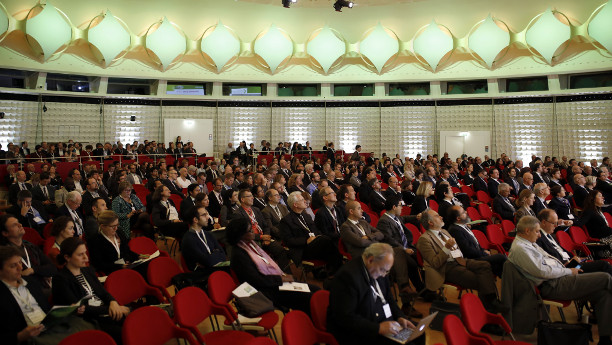Global agenda for sustainable bioeconomy adopted
At the Global Bioeconomy Summit in Berlin, about 700 participants from 82 nations set themselves the goal of increasing the involvement of the bioeconomy in sustainable development and the battle against climate change.

The Bioeconomy Council of the German Government had invited delegates from all over the world to Berlin to attend this first Global Bioeconomy Summit from 24 - 26 November. At the end, the participants agreed on a final communiqé, highlighting five priorities. Summing up with regard to the Sustainable Development Summit in New York and the upcoming climate negotiations in Paris, Christine Lang, Co-Chair of the Bioeconomy Council, said, "Sustainability is one of the top issues on the political agenda. 2015 is the year of major international negotiations. The Global Bioeconomy Summit layed the foundations to integrate the bioeconomy in this process."
About 700 participants from 82 countries came together for the first time in Berlin to exchange views on how the bioeconomy will play an even greater role in the future at an international level, and how it can be included in the agendas of existing negotiating processes.
At the end, they defined a common goal: to use fewer fossil resources and to use renewable resources instead. However, there are a great number of challenges to overcome along this route. In a final communiqué (more information: PDF Download) the participants of the Global Bioeconomy Summit defined five priorities of a global political agenda on sustainable bioeconomy:
- To use renewable resources, ensure food security and protect the ecosystem.
- The bioeconomy's contributions towards the Sustainable Development Goals should be rendered measurable
- Economic and scientific collaboration should be promoted and
- Education, joint learning and dialogue should be driven forward, and
- Not just individual sections but the bioeconomy as a whole should be considered in the global negotiations for COP 21, the Sustainable Development Goals and trade.
- The film presents some highlights of the conference.
Bioeconomy is unterrepresented as international policy issue
Daniel Barben, member of the Global Bioeconomy Summit conference committee, said, "In view of the fact that 45 countries in the world are pursuing bioeconomy strategies, the bioeconomy is underrepresented as an international policy issue. This Summit has shown that we are taking a step in the right direction."
More than 100 international speakers presented policy concepts and concrete examples on over 60 posters and eleven discussion rounds during the conference in Berlin. The FAO, the OECD, the European Commission and the International Energy Agency also took part in the Summit with their own workshops. The German Bioeconomy Council presented comprehensive studies on the bioeconomy: an analysis of the global political importance of the bioeconomy and a Delphi study featuring flagship projects (more information: PDF Download).
Need of international coordination
The overall aim of the Global Bioeconomy Summit is to strenghten the global visibility of bioeconomy. Joachim von Braun, Co-Chair of the Bioeconomy Council, said, "Germany has a global top position in bioeconomy. This brings us in a responsible position to share our knowledge. Together with our partners we will ensure that the results of the Summit are incorporated in international discussions." The Bioeconomy Council's goal, therefore is for the Global Bioeconomy Summit to take place again in two years' time. "We await suggestions for the next location", Christine Lang said in her final remarks.
© bioökonomie.de/sw


